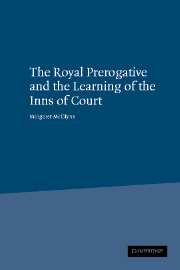Book contents
- Frontmatter
- Contents
- Preface
- List of figures
- List of abbreviations
- Introduction
- 1 The early readings
- 2 Expansion and debate
- 3 Frowyk and Constable on primer seisin
- 4 Spelman, Yorke, and the campaign against uses
- 5 The Edwardian readers and beyond
- Conclusion
- Notes on the appendixes
- Appendix 1 Thomas Frowyk's reading on Prerogativa Regis
- Appendix 2 John Spelman's reading on Prerogativa Regis
- Bibliography
- Index
4 - Spelman, Yorke, and the campaign against uses
Published online by Cambridge University Press: 04 July 2009
- Frontmatter
- Contents
- Preface
- List of figures
- List of abbreviations
- Introduction
- 1 The early readings
- 2 Expansion and debate
- 3 Frowyk and Constable on primer seisin
- 4 Spelman, Yorke, and the campaign against uses
- 5 The Edwardian readers and beyond
- Conclusion
- Notes on the appendixes
- Appendix 1 Thomas Frowyk's reading on Prerogativa Regis
- Appendix 2 John Spelman's reading on Prerogativa Regis
- Bibliography
- Index
Summary
The first reading of Henry VIII's reign came in 1521, when John Spelman, another serjeant-elect giving his third reading, chose to revive the topic. In the circumstances of Henry VIII's rule, a new treatment of the law was necessary, one which would take into consideration both the earlier readings and the changes of his reign. The timing of this re-reading requires some consideration. It was not simply a response to the new monarch, for Henry VIII had already been on the throne for twelve years. The vagaries of the calls of serjeants may go some way to explaining why Prerogativa Regis had not been treated earlier in the reign, but, as Port's reading demonstrates, it was possible, though not particularly useful, for a more junior reader to take on the topic. However, a consideration of the king's policies early in his reign suggests reasons for both the gap and the renewed interest in the topic in 1521.
When Henry followed his father to the throne of England there was a sense of a new beginning, but, as far as the administration of the prerogative was concerned, the changes were more apparent than real. Henry VII's financial policy had been cordially disliked, and his son clearly set out to soothe public opinion on this matter. On his accession, Henry confirmed the pardon granted by his father shortly before his death and proclaimed a more ample pardon, but in true Tudor style he excepted debt.
- Type
- Chapter
- Information
- The Royal Prerogative and the Learning of the Inns of Court , pp. 160 - 204Publisher: Cambridge University PressPrint publication year: 2003



